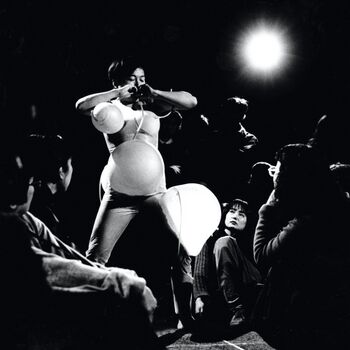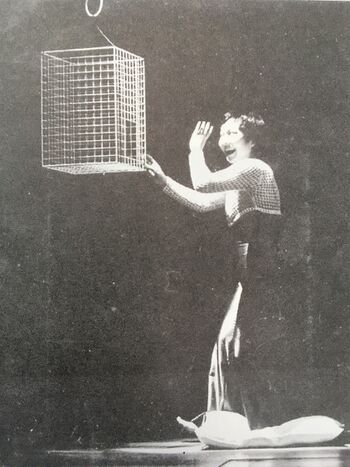Tari Ito
Tari Ito (伊藤 塔莉, born Miwako Itō, 1951, Tokyo – 22 September 2021) was an activist and performing Japanese art pioneer.
Tari Ito came out as a lesbian during the 1996 performance piece, Jigazō [Self-Portrait]. Using her words and her body, she gave shape to the serious conditions that she and her society experienced, continually striving for new forms of expression throughout her life and career. T. Itō enrolled in the Fine Arts course at Wako University in 1969, a time when the social upheavals of student and anti-Vietnam War protests were sweeping through society. Fascinated by expressions involving bodily rather than painterly intervention, she began studying miming. Having continuously sought personal expression through a process of trial and error, a breakthrough came in the four years she spent in the Netherlands from 1982 to 1986. Encountering a new mode of expression at the Theater Het Klein in Eindhoven run by Halina Witek, Tari Ito found success with the work Timing (1983) and continued to work in the Netherlands.
Upon her return to Japan, Tari Ito immediately began clothing her bare skin in latex and rubber garments to emphasise her performance activities. In focusing on the skin, a boundary between interior and exterior, she attempted a connection to the world at large. Following this she conducted a nine-city tour of Canada and gave numerous performances in Asian territories, such as Indonesia, Thailand, Hong Kong and South Korea, as well as in Europe and the United States.
At the same time Tari Ito created a series of spaces in which people could interact with one another. In 1994 she formed the Women's Art Network (WAN, 1994-2008) in Tokyo, and in 2001 she held the Women Breaking Boundaries 21 exhibition in Tokyo and Osaka. Founded on feminist principles and run by the artists themselves, the exhibition featured work by 39 artists from all over Asia, including Arahmaiani (b. 1961, from Indonesia) and Amanda Heng (b. 1951, from Singapore), with whom she had already interacted during the Womanifesto project in Thailand, and the Malaysian-born Canadian film director Desiree Lim (b. 1971) documented the event.
In 1998, now living openly as a lesbian, Tari Ito celebrated her sexuality in Watash o ikirukoto [Me being me], a performance in which she danced on a stage while systematically deconstructing and covering herself in the pieces of a large vagina made from latex condoms. In 2003 she established PA/F SPACE in Tokyo as a space for the intersection of performance art and feminism, holding various events like PA/F Night and Pafschool to connect lesbians, artists and activists. Finally, she showed sympathy with the resentments felt by the comfort women of the Japanese military in Anata o wasurenai [I will not Forget You, 2006], a performance during which she peeled onions. In all these works, Tari Ito attempted a response to the issues that are constantly hidden from society, including sexual violence, the US military base presence in Okinawa and the radioactive contamination.
At the age of 60, Tari Ito was diagnosed with amyotrophic lateral sclerosis (ALS) and gradually became unable to move her body. Instead, she raised her voice against the irrationality of the Japanese welfare administration and continued her work. Her last work, 37-chō ko ga nemuri ni tsuku mae ni [Before 37 Trillion Pieces Get to Sleep] – 37 trillion is the number of cells in the human body – was performed in Tokyo and Canada in 2019, and finally in Tokyo in 2021. (2022)
- Links
- Website
- AWARE
- Tribute: Pamela Wong (ArtAsiaPacific).
- Wikipedia

